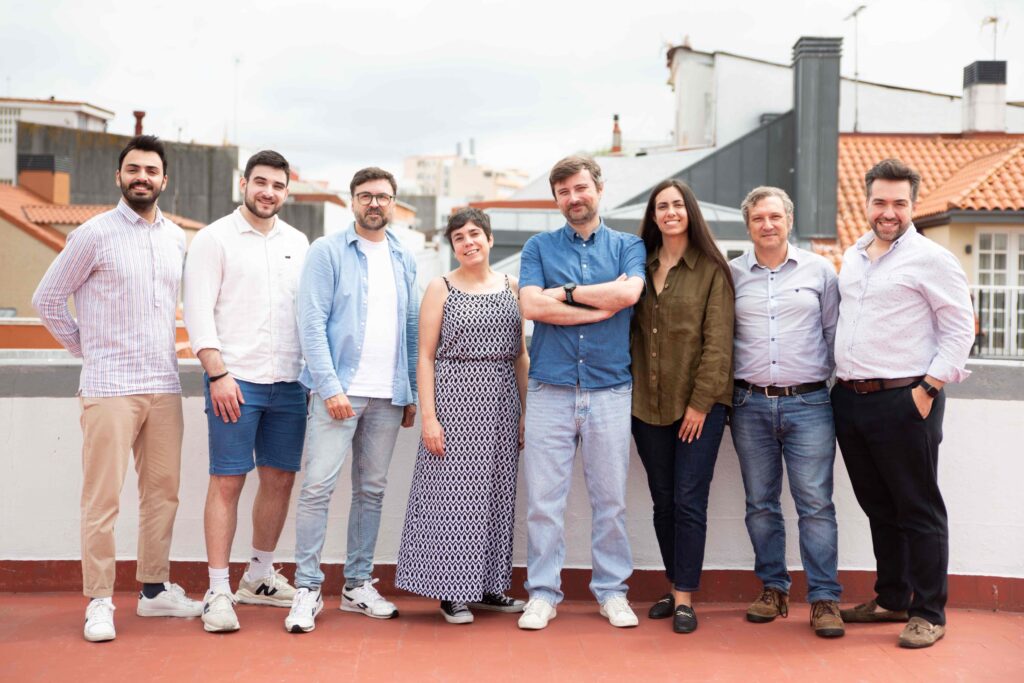In clinical practice, proper interpretation of brain imaging for detection and diagnosis of neurodegenerative disorders is one of the biggers worries medical professionals have.
In order to find an answer to this problem, the Bioga associate biotech company Qubiotech was born in 2014, established in A Coruña. They did this parting from the transference of a quantifying imaging algorithm for Positron Emission Tomography (PET), developed by the Nuclear Medicine and Molecular Imaging Research Group, from the Fundación Instituto de Investigación Sanitaria de Santiago de Compostela (FIDIS), lead by the researcher Pablo Aguiar.
“This is a group that, being physically located within the Complejo Hospitalario Universitario de Santiago, is in direct contact with the clinical assistance reality, from both the sides of the professionals and the patients. This allowed for the development of software designed specifically to perfectly fit the day to day of this reality and the solving of real necesities, with advantages not provided by other products on the market”, explains Daniel Fernández, manager of Qubiotech.
The result of this research made inroads for a technological solution named Neurocloud, focused on helping doctors identifying abnormalities within the brain, when compared to a normal brain. “Tomography imaging is hard to interpret for nuclear doctors, due to the fact that the brain is complex. Imaging does not show anatomical areas, but color maps indicating metabolic activity within the brain. In many occasions, professionals have to make hard decisions by using information that has complex interpretations”, details Daniel.
The advantage this technology has, when compared to other existing technologies in the market, is that it offers great ease of use, and a complete automation of the process, as it does not require human intervention, reducing time costs, which is fundamental in the clinical practice in order to optimize the efficiency of the process.
On the other hand, the clinical validation with patients that was undertaken in the Hospital Universitario de Santiago also demonstrated that, in 25% of the cases, it provided new, relevant information, helping refine and hit the nail on the head when it came to a proper diagnosis. What’s more, Neurocloud offers information that is impossible for a doctor to obtain visually: a proper quantification of just how different is an area when compared to a healthy individual, which introduces new variables to the diagnosis.
“All of these advantages allow Neurocloud to be a product that integrates itself wonderfully into the clinical flow, solving immediate needs, something that has been key in its implementation within the market”, explains Daniel Fernández.
Currently, Qubiotech is present in 30 hospitals around Spain and Portugal, for their use in nuclear medicine, radiology, epilepsy, etc.
With their sights on the future, the company is centered on two key challenges. The first one, their internationalization, in which they are already performing their first steps and initial contacts. The second one, is to keep developing new products, starting with R&D solutions focused on the oncology field.
In this aspect, they are participating in the DIAGBI project, coordinated by the Centro de Investigación en Medicina Molecular y Enfermedades Crónicas (CIMUS) of the USC, and which has the support of the Ministerio de Ciencia e Innovación. Their goal is to develop a new technology that allows for the early diagnosis and non invasive following of the most aggressive brain tumors, which have the lowest life expectancy for patients, such as the glioblastmas.
Qubiotech is one of the most notable and recognized companies within the Galician biotech ecosystem. In Daniel Fernández‘s opinion, “the sector is progressing properly, and it grows in an adequate and sutainable way that makes sense. For it to grow, you not only need knowledge, financing, auxiliary services, etc… you need all of the ecosystem to grow together, and that is something we are doing well. The knowledge generated in these research centers is top notch. However, we need to keep improving access to financing, and we also need to continue to provice transfer tools, for that knowledge to turn into economic value in the market”; he concludes.
Original article: Tecnología gallega para ayudar en el diagnóstico de enfermedades neurodegenerativas – Oficina Galicia Empresa (13/10/2023).
For BIOGA, it is a priority to promote intersectoral collaboration between entities and to power networking activities, both national and international. If you want to know more about us, please click the following link.
- CiMUS and ABAC Therapeutics makes inroads in the fight against antibiotic resistant bacteria
- Innovation with Galician DNA: KeyBiological uses ozone to create highly effective cosmetics
- Galician biotech ecosystem seals collaboration alliances with the bioregions of Japan and the United Kingdom
- Ayming Meets: Entrepeneurship in the biotech sector with Virginia González
- The Xunta promotes the new In Proteins for All biotech plant in Curtis
- AINIA and MAPA propell the development of startups in the agri-food biotech sector
- Ecocelta patents Europe´s first ever mascot sand made of mussel shell
- AMSLab incorporates their five firsm into BIOGA as a “commitment with Galicia’s biotech ecosystem”.
- BIOGA centers the third ARI Hub breakfast
- Zendal starts up their human vaccine manufacturing facility in Portugal

